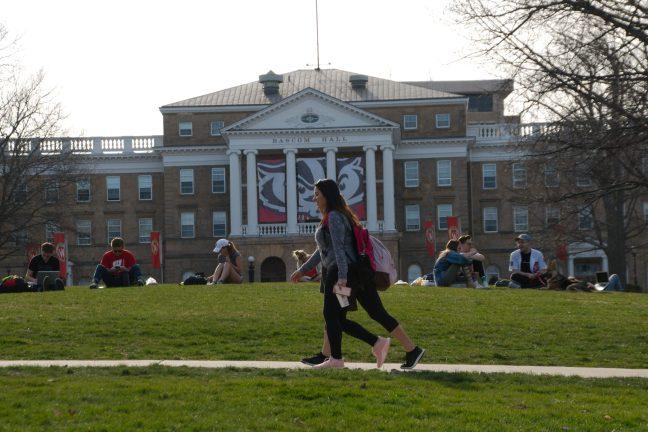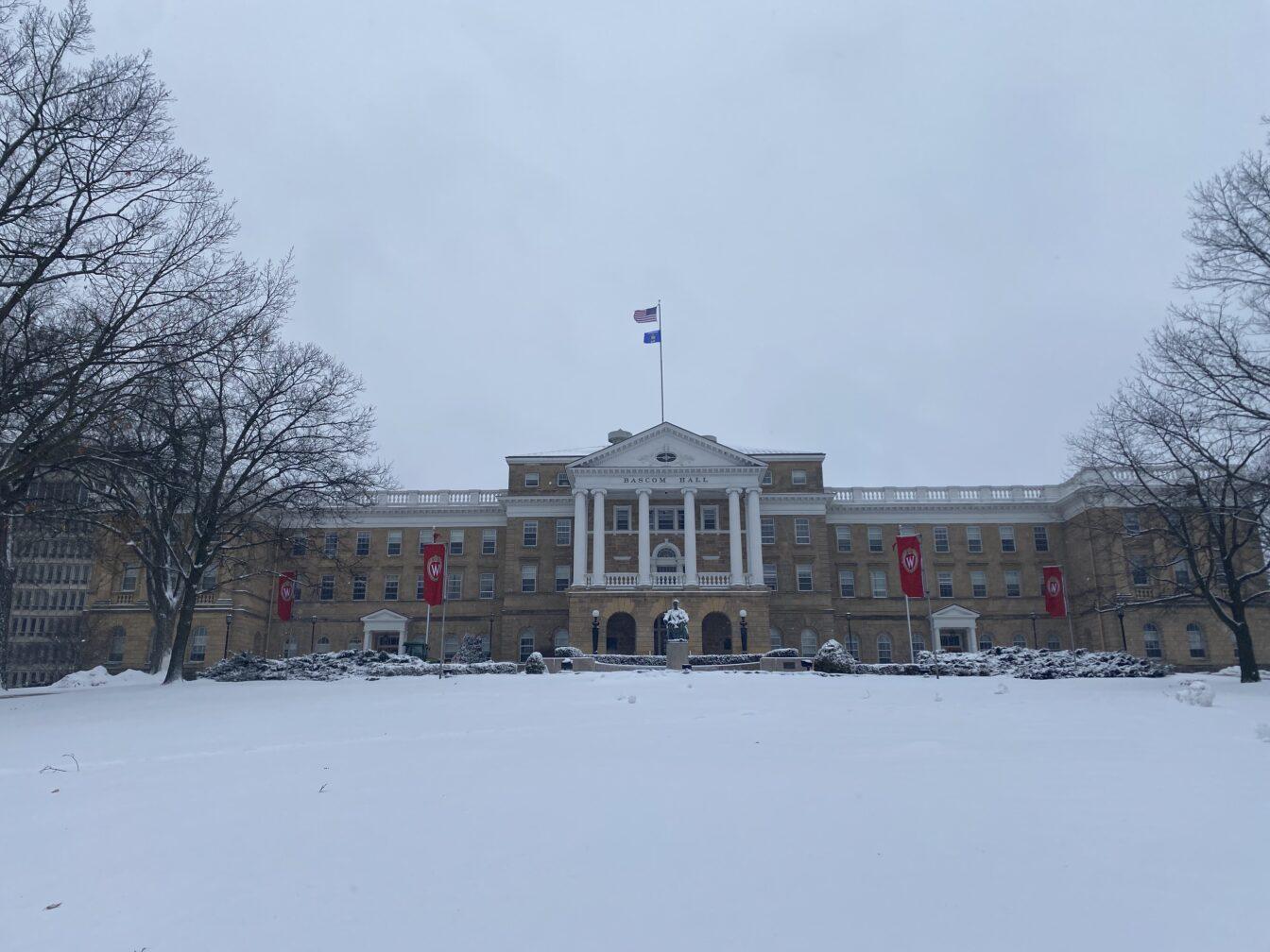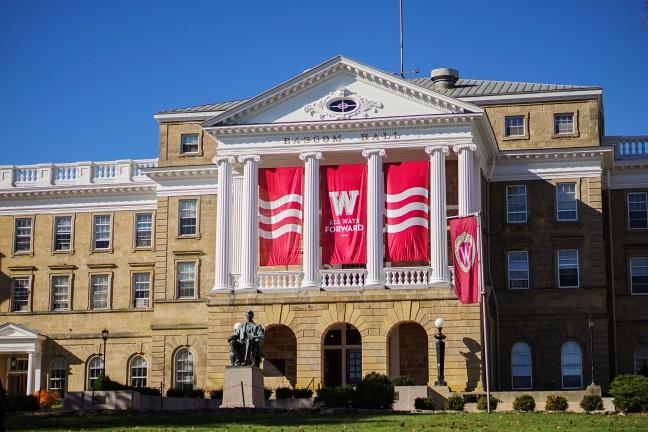Fall 2018 was a semester to remember. From an influential midterm election to an unprecedented lame-duck session, this semester brought significant change to Wisconsin. Here are the award-worthy stories from the fall of 2018.
Quintez Cephus trial: Least Valuable Player Award
In the era of #MeToo, thousands of women have shown solidarity and strength by coming forward after sexual assault. Though we should focus on the bravery of the survivors, one can’t help but notice the ferocity and frequency of such reports — and how they seem to permeate every facet of our culture, Wisconsin included.
As Badger fans geared up for another football season at Camp Randall, news broke on Aug. 20 that wide receiver Quintez Cephus was charged with second and third-degree sexual assault after an incident which allegedly occurred in April. Cephus had taken a leave of absence two days before he was charged. Fellow player Danny Davis was also implicated but only faced a two-game suspension.
UW ought to hold off on Title IX investigation until Cephus’ criminal trial concludes
In early October, Cephus filed a lawsuit against the University of Wisconsin, claiming their disciplinary investigation violated his constitutional rights. The suit was filed with the U.S. District Court, seeking an unspecified amount of money for damage to Cephus’ reputation, past and future economic losses, and emotional and psychological harm.
Following the brief sentencing of former UW student Alec Cook who plead guilty to sexual assault charges involving multiple women, the trial and sentencing of Cephus still looms in the minds of the UW community. Whether justice will be served — an whatever form it takes — remains to be seen.
Bucky’s Tuition Promise: World’s Most Generous Mascot Award
UW Chancellor Rebecca Blank announced in February an ambitious plan to make attending UW more feasible for low-income Wisconsin students. “Bucky’s Tuition Promise,” as named by the university, would cover tuition costs and segregated fees for in-state students whose family’s gross adjusted income was less than $56,000. Unlike exclusive scholarship programs where lists of eligibility requirements can be overwhelming, the plan only required students to fill out their Free Application for Federal Student Aid where they would be notified subsequently if qualified.
Incoming freshmen would see four years of college expenses paid for while in-state transfer students could receive up to two. Blank promised such financial relief to 800 students within the program’s first year with funding coming from private donations and other institutional resources.
Bucky Promise takes first step in rejecting exploitative, inaccessible education system
Doubts about the program’s feasibility were put to bed with the release of the program’s first report. The lives of 796 incoming UW students and their families were forever changed in the program’s inaugural year — that’s nearly 20 percent of the incoming freshman class.
Of 72 Wisconsin counties, 65, or 90 percent, were represented by students benefiting from the promise, demonstrating not only an expansive representational reach but a dedication to serving Wisconsin students. The program’s importance is twofold: it addresses the issue of affordability often overlooked by institutions of higher education and is designed to assist Wisconsin’s agricultural families whose assets are typically high but whose incomes are low.
In an era where student loan and tuition rates have become crippling even to those with an above-average family income, UW’s commitment to expanding access to higher education is overdue at worst and admirable at best. One can only hope the program sees a bright future, lighting the way for students who now have the opportunity to chase their aspirations without the burden of financial limitations.
Mayoral election: Guess who’s back, back again? Award
Just a few months ago, this board wrote that “Madison will bid farewell to longtime Mayor Paul Soglin next year, who announced this summer he will not seek reelection.” We’ve since had to eat those words because Soglin has rescinded that announcement and is again running for mayor.
Soglin, who was first elected in 1973 and will have served as mayor for a grand total of 22 years by the time of next year’s election, will be up for a tough battle to retain his position. He faces a long and growing list of challengers, including Ald. Mo Cheeks, former Ald. Satya Rhodes-Conway, Tenant Resource Center Director Brenda Konkel, River Alliance of Wisconsin Executive Director Raj Shukla, City of Madison Racial Equity Coordinator Toriana Pettaway, school board member Michael Flores and local comedian Nick Hart.
With the February primary and April general elections quickly approaching, the race is sure to heat up in the coming months. An obvious question heading into next year is how these candidates, all with strikingly similar policy platforms, plan on sufficiently differentiating themselves. Will Soglin’s clout, gained from his decades of experience, be enough to win him another term as mayor? Or will one of his challengers add his name to the growing list of long-serving incumbents ousted by younger, less experienced candidates?
Stay tuned. It’s absolutely going to be messy.
Freshmen city council candidates: Best New Star of the Year Award
From the March For Our Lives movement to the surge in youth voter participation to the high number of millennials elected to office, 2018 was a big year for young people and their impact on American politics.
Madison, home to almost 50,000 college students and thousands of young professionals, is certainly no exception to this national trend. Ald. Zach Wood, who has represented the campus district on the City Council since 2015, was first elected as a college senior. Next year, he’ll be stepping down, paving the way for a competitive election to replace him. UW freshmen Avra Reddy and Matthew Mitnick have announced their candidacies for Wood’s seat, which encompasses most UW residence halls and the area surrounding campus.
UW freshman Matthew Mitnick kicks off alder campaign at Ian’s Pizza
While the campus district has traditionally been represented by a younger councilmember, Mitnick, at 18, and Reddy, at 19, would be some of the youngest elected officials in City Council history. While neither hail from Wisconsin, both have been quick to highlight their accomplishments and stress that their young age is not an indication of a lack of experience.
Mitnick, the son of public servants in California who has worked closely with the Associated Students of Madison during his time at UW, and Reddy, who has cultivated experience with progressive political campaigns since she moved to Madison for the summer at age 16, have identified transportation, safety and affordable housing as some of the most pressing issues facing UW students.
As Reddy and Mitnick are likely to be the only candidates for the race, the fate of the campus district will be sealed in the April 2019 general election.
Midterm recap: Who’s The New Guy? Award
The midterm elections this year were the first major test for Democrats following President Donald Trump’s win in 2016. Despite falling short of “Blue Wave” expectations nationwide, Democrats performed well, retaking the U.S. House of Representatives and winning several governorships. In Wisconsin — a state which has voted for a Republican governor three times, a Republican U.S. Senator twice and a Republican president once in the past eight years — Democrats performed well, ousting the once invincible Gov. Scott Walker, replacing Attorney General Brad Schimel and re-electing Sen. Tammy Baldwin, D-Wis.
In Madison, incumbent U.S. Rep. Mark Pocan, D-Madison, faced no challenger and will represent Wisconsin’s second Congressional district for another two years. At the state Capitol, state Reps. Chris Taylor and Melissa Sargent faced no challenger and will continue to represent their Madison-area constituencies. Joining them and replacing outgoing Rep. Terese Berceau is Shelia Stubbs, a Dane County supervisor who received national attention after a local resident called the police on her, her young daughter and her mother for what was wrongly believed to be drug-related activity while they canvassed.
In wake of midterm elections, Wisconsin voters are not subject to ideological shift
The most exciting moment of the night for Democrats, however, came when state Education Superintendent Tony Evers defeated Walker. After hours of waiting for results to be finalized, thousands of Milwaukee County absentee ballots broke heavily in Evers’ favor, pushing him over the edge and to victory.
The next morning, Walker tweeted a photo of a Bible quote with no caption, which many took to be an acknowledgment of his loss. Prayers, however, proved to be insufficient for Wisconsin Republicans as they licked their wounds following their election night losses. Sometimes getting over a breakup requires the subversion of electoral democracy, right? More on that below.
Lame-Duck Session: “Fair Election? Never Heard of Her” Award
In a 2018 midterm election that saw a resurgence of Democrats elected statewide, namely to the offices of governor and attorney general, Wisconsin Republicans took unprecedented measures to curb the power of the incoming administration.
Nov. 30, over 140 pages of extraordinary session bills were released to the public just as business hours waned to a close. By Monday, lawmakers were expected to vote — a laughably weak exercise of democracy considering the Legislature is securely controlled by Republicans and the bills targeted incoming Democrats. The timing of the bills’ release was no accident either — they were to be rushed through the Legislature before Evers took office.
The first session meeting Monday was drowned out by hundreds of protesters intent on being heard as the Legislature moved to limit the influence of incoming Democrats in determining the future of the state government. Republicans’ actions were motivated out of a desire to salvage the power they fairly lost to make governance harder for Evers and Attorney General-elect Josh Kaul.
Rare lame-duck session strips Wisconsin’s democracy of legitimacy, cheats voters
Despite public opposition and fierce condemnation from Wisconsin Democrats, the fast-tracked legislation passed. A reduction of the early voting period, the limitation of Evers’ ability to appoint individuals crucial to shaping Wisconsin’s economy and limitations on the governor’s power to enact rules which prescribe how state laws are enforced are now one Walker signature away from becoming law.
For Kaul, the story is much the same. Pending Walker’s approval, legislators sued in their official capacity can now hire private attorneys at the expense of taxpayers rather than be represented by the Department of Justice, which Kaul will oversee. With a Democrat set to lead the DOJ, Republicans have made sure their influence will be reduced.
This last-minute session is not a measure to enforce checks and balances on the executive branch independent of Evers’ presence, as Assembly Speaker Robin Vos, R-Rochester, has suggested. It’s rather a greedy misuse of representative power which should be addressed as such.
Foxconn updates: “The Unreal Deal Award”
A study from Georgetown University found Wisconsin has lost 13,000 “good jobs” for non-college graduates in the last 25 years — which seems surprising considering Wisconsin’s record low unemployment rate. Both statistics come into play when Foxconn is concerned.
Since July 2017, Wisconsinites have been promised 13,000 new factory jobs as part of the Foxconn development project in Mount Pleasant, Wisc. Through the course of more than a year, cries of both outrage and praise make up the discourse surrounding the establishment of Foxconn. Whether it’s the increase in emissions, rollback of environmental protection policies or the incredible amount of subsidies the state will give to Wisconsin — more than what New York and Virginia will be paying for the new Amazon headquarters — Wisconsinites are fired up about Foxconn, and rightfully so. Just a few months ago, the Milwaukee Journal Sentinel reported that by 2022, 5,000 of these jobs — nearly 40 percent — would be in manufacturing.
Wisconsin workers have been ‘Foxconned’ out of promised jobs
But just as Wisconsin was distracted by the midterm elections, news broke that Foxconn would be going back on its pivotal promise. Not only would Foxconn hire foreign workers to fill the 13,000 new jobs, but 90 percent of them wouldn’t even be manufacturing jobs to begin with. Foxconn has denied these claims, and their legitimacy is anyone’s guess at this point.
Walker claimed Foxconn would “… make us a brain gain state, not a brain drain state.” But this statement implies Foxconn outsourcing its workers, whether they’re from neighboring states or opposite hemispheres. Regardless, two things can be assumed from all these developments — Wisconsin workers do not hold all the cards, and Wisconsin workers are not Foxconn’s top priority.
The Editorial Board serves to represent the voice of the Badger Herald editorial department, distinct from the newsroom, and does not necessarily reflect the views of each staff member.













